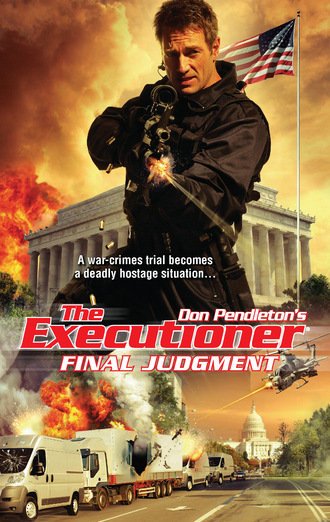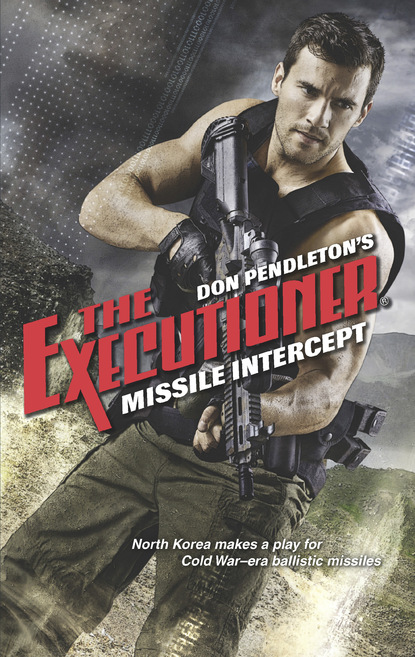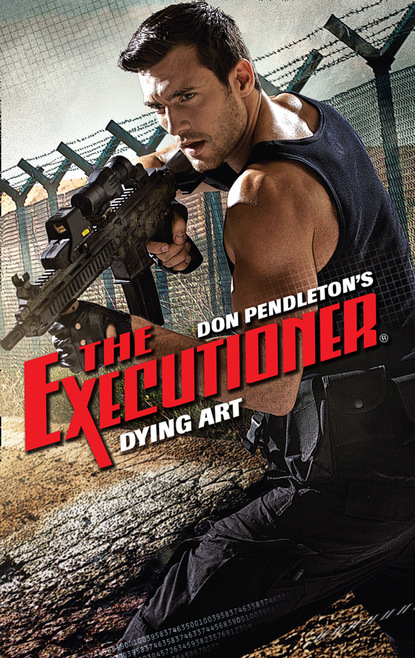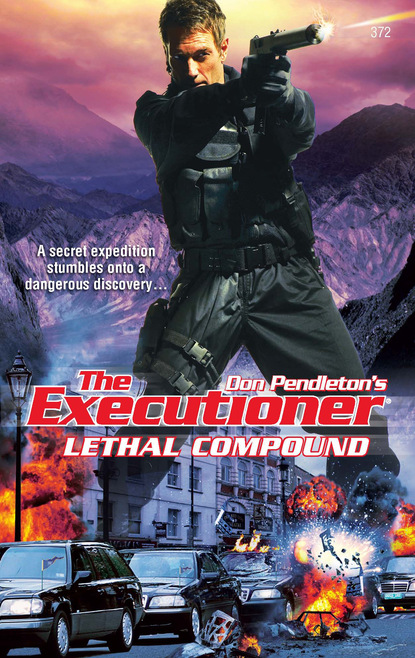
Полная версия
Final Judgment

JUDGMENT DAY
When neo-Nazis seize a U.S. courthouse and demand the release of their leader, Mack Bolan is called to go in under the radar and eliminate the gunmen. But before he can finish the job, the WWII Nazi escapes. With hostages.
Bolan knows that more innocent blood will be shed unless he can take out the neo-Nazis—every last one. And speed is of the essence, as the war criminal has picked the leader of a holocaust remembrance group as his new target. This time there will be no escape. The Executioner is judge and jury, and he’s ready to deliver his own form of justice.
Claymore mines had been stashed in the stairwell
But Bolan was prepared for them. He skirted the stairs until the banister was at chest height, then hopped over the railing, well out of the effective kill zone of the explosives. The balcony was clear. A set of double doors took him to an anteroom.
The sentry stationed there was pressed against the wall, opposite the door. As the terrorist leveled his shotgun, Bolan swiveled, bringing up the M4.
The shotgun roared, the impact slamming into Bolan’s gut like a hammer blow. Air rushed from his lungs and he went down, landing on his back, hard.
Then all he could see was the barrel of the shotgun. The neo-Nazi racked the pump action. “Bye-bye, asshole.”
Final Judgment

Don Pendleton

www.mirabooks.co.uk
The rifle…has no moral stature. Naturally, it may be used by evil men for evil purposes, but there are more good men than evil, and while the latter cannot be persuaded to the path of righteousness by propaganda, they can certainly be corrected by good men with rifles.
—John Dean “Jeff” Cooper
1920–2006
Every man confronted with the need to correct a terrible wrong—to strike back at those who’ve taken his blood, destroyed his life—must choose. He can choose the path of revenge or he can choose the path of justice.
—Mack Bolan
THE

LEGEND
Nothing less than a war could have fashioned the destiny of the man called Mack Bolan. Bolan earned the Executioner title in the jungle hell of Vietnam.
But this soldier also wore another name—Sergeant Mercy. He was so tagged because of the compassion he showed to wounded comrades-in-arms and Vietnamese civilians.
Mack Bolan’s second tour of duty ended prematurely when he was given emergency leave to return home and bury his family, victims of the Mob. Then he declared a one-man war against the Mafia.
He confronted the Families head-on from coast to coast, and soon a hope of victory began to appear. But Bolan had broken society’s every rule. That same society started gunning for this elusive warrior—to no avail.
So Bolan was offered amnesty to work within the system against terrorism. This time, as an employee of Uncle Sam, Bolan became Colonel John Phoenix. With a com-mand center at Stony Man Farm in Virginia, he and his new allies—Able Team and Phoenix Force—waged relentless war on a new adversary: the KGB.
But when his one true love, April Rose, died at the hands of the Soviet terror machine, Bolan severed all ties with Establishment authority.
Now, after a lengthy lone-wolf struggle and much soul-searching, the Executioner has agreed to enter an “arm’s-length” alliance with his government once more, reserving the right to pursue personal missions in his Everlasting War.
Special thanks and acknowledgment to Phil Elmore for his contribution to this work.
Contents
Chapter 1
Chapter 2
Chapter 3
Chapter 4
Chapter 5
Chapter 6
Chapter 7
Chapter 8
Chapter 9
Chapter 10
Chapter 11
Chapter 12
Chapter 13
Chapter 14
Chapter 15
Chapter 16
Chapter 17
Chapter 18
Epilogue
Chapter 1
Mack Bolan chopped the sentry in the throat with the edge of his hand. The neo-Nazi, clad in camouflage fatigues, made choking, gurgling noises as he collapsed to his knees, his eyes wide. The plea on his face was obvious.
Bolan smashed his elbow in and down. The sentry collapsed in a tortured heap on the floor of the stairwell. The man still known to a select few as the Executioner deftly plucked a Kalashnikov rifle from the neo-Nazi’s grip, popped the cover and removed the bolt. He tossed the latter down the steps and left the disabled weapon with the unconscious man—but not before zip-tying the sentry’s hands and feet and running two layers of black gaffer tape across the man’s mouth.
Then Bolan waited.
Few men could be truly still when they needed to be. Mack Bolan was a master, and now he waited to see if the noise of his covert insertion had alerted anyone else. The access door he had used to gain entry to the District of Columbia courthouse had been guarded from without as well as by the sentry he had just removed, but the terrorists were expecting a SWAT incursion or some other force to attack en masse. They weren’t prepared for a single man, because in their minds one armed man wasn’t a threat.
They were wrong.
Bolan carried his standard complement of weaponry over his combat blacksuit and attached to his web gear. His suppressed and custom-tuned Beretta 93-R machine pistol rode in the shoulder holster under his left arm; his .44 Magnum Desert Eagle pistol rode in his waistband behind his right hip, snug in a Kydex friction-fit scabbard. On his web gear, inverted for a fast draw, was a combat dagger with a tapered, rubber-coated handle and an upswept, razor-sharp blade. The knife was the length of Bolan’s forearm.
Across his chest he wore a canvas war bag bearing more munitions and combat items, while slung on his body in a single-point harness was a heavily modified M-4 carbine. The cut-down assault rifle bore red-dot optics, and an adapted M-203 grenade launcher was slung beneath its barrel. It was also capable of full-automatic fire, not just 3-round bursts, thanks to the tender ministrations of John “Cowboy” Kissinger, the Stony Man Farm’s armorer. Not for the first time it occurred to Bolan that, were he ever to cut ties with the Farm and the Sensitive Operations Group, he would genuinely miss the toys.
It was Hal Brognola, director of SOG, who had dispatched the Executioner on this mission. The call, scrambled through Bolan’s secure satellite-capable smartphone, held an edge of urgency that immediately triggered the soldier’s combat instincts.
“Striker,” Brognola had said, using Bolan’s code name, “our justice system is under attack.”
This was a sensitive point for the big Fed, for Brognola operated under the auspices of the Justice Department. Bolan knew his old friend would take very seriously any threat to the system he and the counterterror operatives of Stony Man Farm worked so hard to protect.
“I’m listening, Hal,” Bolan had said.
“Klaus Reinhardt Nitzche,” Brognola said, practically spitting each word. “Heard of him?”
“That’s the old Nazi concentration camp guard they just caught in Buenos Aires, isn’t it?”
“Nitzche was more than just a guard,” Brognola said. “He was the provisional camp commander of Schlechterwald, one of the more obscure but vile death camps established in the waning days of World War II. According to records recovered after the camp’s liberation, Nitzche assassinated the camp’s SS leader and assumed his place because Nitzche believed the SS was too soft on the prisoners. He remained in place until Hitler’s suicide, disappearing sometime during the chaos surrounding the end of the war and the collapse of Nazi Germany.”
“Sounds like a beautiful human being.”
“He was a monster,” Brognola said. “Rumor has it that he kept a very detailed diary, some pages of which he copied into the camp’s logs. Those logs, recovered by American forces who assaulted the camp, detail atrocities you cannot imagine, Striker.”
Bolan said nothing to that. He had seen plenty of atrocities in his endless war. He doubted there was much a human being could do to violate another that he hadn’t encountered, but the Nazis had proved extremely imaginative on that score.
“Do you recall,” Brognola said, “the Holocaust remembrance program broadcast nationally last fall?”
“I don’t get to watch a lot of television,” Bolan said.
“The program was notable,” the Fed explained, “because it featured a recorded interview with Eli Berwald. Berwald was a youth when he and his parents were imprisoned and tortured in Schlechterwald.”
“He’d have to be…”
“He’s pushing eighty,” Brognola said, “and not in the best of health. But his mind is strong, as is his passion for revenge. He said as much in the interview, which was taped only weeks before Berwald’s organization, Lantern, brought the eighty-eight-year-old Nitzche kicking and screaming from Argentina.”
“They extracted him?” Bolan asked.
“They kidnapped him,” Brognola said. “Once they had him in the U.S., their legal team jumped through a bunch of hoops. I won’t bore you with all the bureaucratic maneuvers involved. Suffice it to say they eventually had Nitzche processed through our legal system and charged with war crimes. The trial, a real televised circus, was to start today. It was going to be a message, a final blow to the last bastions of World War II. To war criminals, should any be alive and lurking out there today. Lantern has issued several press releases to that effect. Justice Has a Long Memory is their slogan.”
“They have a lot of pull for lobbyists.”
“Lantern is not simply a Jewish activist group,” Brognola said. “It borders on a vigilante organization. They are extremely militant and completely unapologetic about their activities. Much more so in recent years than in the past, but there it is.”
“Can you blame them?” Bolan asked.
“No,” Brognola said. “But that doesn’t change the complications this raises.”
“Such as?”
“Berwald’s Lantern is led primarily by his son, Eli Berwald Jr., known as Aaron to his friends and family. The elder Berwald operates in an advisory capacity, but Aaron is a firebrand. He’s run afoul of weapons charges twice, although both times, strings have been pulled behind the scenes to get him off. His father has powerful friends within the government, as you might expect. Berwald Sr. is no stranger to the games we play here in Washington.”
“And?” Bolan prompted.
“Lantern paid a celebrity bounty hunter some outrageous fee to go into Argentina and kidnap Nitzche,” Brognola said. “You probably haven’t seen the guy’s reality-television program.”
“I can’t say I have.”
“Nitzche was almost killed during the illegal extradition,” Brognola said. “Several men were injured. The bounty hunter is now wanted in Argentina, which is irrelevant, but the fact that Nitzche was guarded by armed men is what makes this complicated. These men were members of a secretive neo-Nazi group called Heil Nitzche, which Klaus Nitzche has been operating under the radar since he went to ground in Buenos Aires all those years ago. I’ve had the team at the Farm digging through the records, now that we know what to look for. The pattern painted is alarming. Heil Nitzche has funding, they have equipment and they have balls. And as of half past eight this morning, they have an entire courthouse right here in Wonderland.”
“A terrorist assault,” Bolan said.
“Yes,” Brognola said. “Nitzche and his HN thugs have seized the building and taken the judge, the jury and the gallery hostage. They’ve got automatic weapons and, we believe, explosives. They’re demanding safe passage by helicopter out of D.C., and if they don’t get it by their deadline this afternoon, they’re going to start killing hostages. Several court security officers have already been killed.”
“Which is where I come in,” Bolan stated.
“Absolutely,” Brognola said. “The Man asked for you specifically, and if he hadn’t, I would have pushed for it. We need you to do what D.C. SWAT personnel and perhaps even Able Team wouldn’t be able to do. A single man may be able to get inside that building and take them down from within. If we mount a coordinated assault, it will quickly become a massacre.”
“Get me there,” Bolan said. “I’ll do it.”
“G-Force is already on his way to your location,” Brognola said, referring to the Farm’s ace pilot, Jack Grimaldi, by his code name. “But this gets worse.”
“Worse than a courthouse full of hostages, held by a Nazi war criminal relic backed by well-equipped enforcers?”
“Lantern is still involved,” Brognola said. “Authorities manning the cordon around the courthouse have twice stopped Eli Berwald Jr. and a team of men armed only with knives. They’re smart. They know that without a firearms violation there’s not much we can do to hold them. The second time, the Metropolitan police took them in on tenuous trespassing charges, but that’s not going to stick.”
“I assume they’re keen to bring Nitzche back into custody themselves?”
“Something like that.” Brognola sighed. “Lord save us from zealous amateurs. They’re not that far away. Lantern has a fairly impressive headquarters in Williamsburg, Virginia. While we can probably keep them from blundering past the cordon and getting themselves shot, I can’t absolutely guarantee you won’t trip over them at some point.”
“I’ll keep that in mind,” Bolan said. It wouldn’t do to put a bullet in a Lantern activist, after mistaking him for one of Nitzche’s neo-Nazi HN goons. “Operational parameters?”
“Save the hostages,” Brognola said.
“And Nitzche?”
“Your discretion. As long as he doesn’t remain at large, the Man will be satisfied. And so will I.”
“You got it,” Bolan said.
“Striker?”
“Yeah?”
“Good hunting,” the big Fed said.
“Thanks.” Bolan had closed the connection, determined to get in position and get to work as soon as possible. Only moments later, he had heard the thrumming of rotor blades. That would be Jack Grimaldi and a helicopter.
The helicopter was a gunship. A care package, bearing the modified M-16 rifle and Bolan’s war bag of munitions, had been aboard.
Now, only hours later, the soldier’s boots were on the ground behind enemy-held territory.
He checked his smartphone’s files, which Stony Man Farm’s mission controller, Barbara Price, had uploaded to his phone while he was in transit to D.C. The layout of the building was simple enough. The construction was very solid—concrete, stone, marble, and reinforcements where applicable. These walls would be more resistant to gunfire than many; a pistol bullet would travel through most interior walls and even some exterior ones in a traditionally framed building. Bolan knew, too, that the sound of his steps would be amplified. He moved carefully, heel to toe, his combat boots as quiet as he could make them on the marble floors.
At the top of the stairwell he found the first claymore-style mine.
It was a few generations removed from the old Vietnam-era claymores, but the device’s purpose was obvious enough. Written in German across the front of the mine were words that roughly translated to “front toward enemy.” Bolan had picked up enough foreign languages through the years that he could tell that much. The mine had an amber LED that blinked once per second.
Bolan shrugged, reached down and turned it around to face the other way.
He moved to the side of the metal fire door, pressed himself against the wall and rapped quietly on the reinforced glass window. “Help!” he said quietly, hoping he was still loud enough to be heard on the other side. “I’ve cut myself! I think I’m bleeding out!”
The response was almost immediate. Another man in camouflage fatigues pushed the door open. His hand was still on the door lever when Bolan reached out, locking his wrist between thumb and index finger. He pulled sharply.
The surprised neo-Nazi had no time to cry out, no time to resist. He made a strange grunting cry as his brain tried to process his sudden freefall through space. Then he landed on his neck in the stairwell below. There was a sickening crunch as vertebrae snapped. The rattle of air escaping his lungs was paced by his evacuating bowels.
Bolan scanned the corpse but saw no weapon. He was holding the door open to prevent it from slamming back into place, where it would lock once more. Sticking his head through the opening, he saw another Kalashnikov leaning upright against the wall.
Amateurs, Bolan thought. He gave this weapon the same disassembly treatment he had given the previous one, separating the bolt from the assault rifle and tossing the component onto the corpse of the rifle’s former owner. He left the weapon itself at the top of the stairwell, behind the door, where it couldn’t be seen by casual observers from the other side.
There were two more claymore-style mines here. He picked them up, checked them, and simply flicked the switches on their electronic detonators. The amber LEDs switched off. He tucked the mines into his war bag.
Moving smoothly down the hall, checking the floor plan on his phone, Bolan caught a glimpse of movement around the corner of the corridor ahead. He ducked into an alcove that housed a trio of pay phones and a water fountain. Waiting, he heard footsteps. There were two men.
“South stairwell,” one of them said. “I say again, south stairwell, this is Rover Two. Come in.”
Bolan knew the stairwell where he’d made his entry faced south. No doubt these HN thugs were checking on their sentry posts—and getting no response from the pair Bolan had just sent to whatever hate-drenched Valhalla these neo-Nazis thought awaited them. When there was no response, the pair would raise an alarm. Bolan’s element of surprise would evaporate.
Well, he’d known that would happen.
Quietly, the soldier popped the retaining snap on his leather shoulder holster, covering the sound with the flesh of his thumb. The Beretta 93-R machine pistol filled his hand as if custom molded to it. He flicked the selector switch to Single as the snout of the attached suppressor cleared leather. There would be a time and place for his own assault rifle, suspended from his harness on its single-point sling, but right now, he wanted quiet.
Bolan leaned out of the alcove as the pair of neo-Nazi terrorists walked past his position. They were perhaps two yards away when he extended the Beretta, lined up his sights on the head of the man with the walkie-talkie and squeezed the trigger.
The two-way radio was soaked in blood when it hit the marble floor. The corpse stood for the briefest of moments before its knees gave way and it toppled. The other sentry, whose AK was slung over his shoulder, slowly turned. The side of his face was speckled crimson.
“Call out and you’re dead,” Bolan warned. “Put the rifle on the floor.”
“You shot him from behind,” the man hissed. Shock and rage twisted his face. His eyes were wide and bloodshot.
“Does that offend your sense of honor?” Bolan asked quietly. “A terrorist holding innocent people hostage, desperate to free an old hatemonger with the torture and death of countless innocent people on his hands? You’re upset that I didn’t follow the rules?”
“Coward,” the sentry said. His hand started to creep across his chest. He was going to try for the rifle. “Race traitor.”
“You know what I hate most about neo-Nazis?” Bolan asked, his voice calm, just the barest hint above a whisper. “You’re always convinced you’re the smartest people in the room. You think you’ve got it all figured out, and anybody who doesn’t agree with your hateful simpleton’s logic must be a sellout to the bogeymen you fear.”
“Zionist Jew-lover—” the neo-Nazi started to shout.
“Shut up,” Bolan said, and shot him in the throat.
The sentry hit the marble. His hands went to his throat. Trying and failing to stem the flow from the wound that had choked off his words, he stared up at Bolan, then bled out.
Chapter 2
Bolan made more than one circuit of the middle level of the courthouse, which opened onto a stairwell leading down to the main gallery, the doors of which were closed and chained from the outside. Four armed, camouflage-clad sentries stood with Kalashnikovs at the ready at the bottom of the semicircular stairs.
Within, Nitzche and the rest of his HN gunmen—those not detailed to secure the structure itself—would be passing the time however it suited them. Even through the thick walls of the courthouse, Bolan could hear the bullhorn-amplified shouts of hostage negotiators coming from behind the police cordon. Brognola and the Farm had provided a comprehensive report outlining what was known of the initial terrorist capture of the building. It showed an above-average level of military awareness that was reflected in the sentries’ cross-patrol communication.
Bolan had no respect for neo-Nazis, but this bunch had more training than was usual, probably because Nitzche had been calling the shots while building the organization to serve him as a private army. That meant the danger they represented to Bolan, and the resistance they could offer, was correspondingly greater than other groups of white supremacists he had faced. Nitzche was, according to their files, a strong and intelligent leader. Such an individual made all the difference when rallying followers like these.
It was time to start chipping away at the opposition.
Before Bolan moved back into the corridor, he positioned his captured remote-detonation mines. Then he circled around to the access stairs that led to the rear of the court. There was a second stairway inside the court itself, accessing a balcony observation level that connected, in turn, to the roof. These were used by reporters and people who attended the proceedings, and were far more public than the stairs at the rear.
The back steps were adjacent to the judge’s chambers and were, according to the plans and information sent to Bolan, used by the presiding judge if he wished to make a discreet exit to the second-floor offices.
Predictably, this access was mined, but none of the weapons bore antitamper switches, such as mercury triggers designed to detonate the device when it was disturbed. Such measures would have made short work of the counteroperation Bolan was running. His adversaries were trained, he decided, but they weren’t that trained. He permitted himself a wry smile as he repositioned two more of the mines at the edge of the access stairs.
The neo-Nazis probably thought an assault on the building would be loud and obvious. So they’d have plenty of warning. Nitzche’s people had likely planned to use the mines as a first-wave defense. They would have been effective, too, had it come to that. Brognola and the President had been correct to think one man could do what a coordinated and overwhelming use of force could not.
Such operations always entailed heavy losses. Bolan’s acceptable percentage of noncombatant deaths was zero, but there were other counterterror operatives who didn’t feel that way. Russian special forces had several times demonstrated that, and painfully, in one case putting down a high-profile hostage standoff using anesthetic gas. They had gassed the target building and then swept through it, checking the unconscious occupants and shooting the terrorists in the head. The tactic was brutal, efficient and very, very final.












